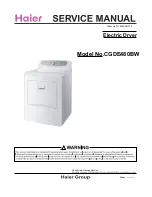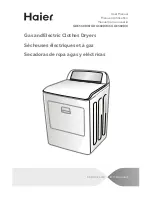
45
SECTION VII
TROUBLESHOOTING
IMPORTANT: YOU MUST DISCONTINUE AND LOCKOUT THE ELECTRIC SUPPLY
AND THE GAS SUPPLY OR THE STEAM SUPPLY BEFORE ANY
COVERS OR GUARDS ARE REMOVED FROM THE DRYER TO
ALLOW ACCESS FOR CLEANING, ADJUSTING, INSTALLATION, OR
TESTING OF ANY EQUIPMENT PER OSHA
(Occupational Safety and Health
Administration)
STANDARDS.
The information provided will help isolate the most probable component(s) associated with the difficulty described.
The experienced technician
realizes, however, that a loose connection or broken/shorted wire may be at fault
where electrical components
are concerned...and not necessarily the suspected component
itself.
Electrical parts
should always be
checked for failure before being returned to the
factory.
The information
provided
should not be
misconstrued as a handbook for use by an untrained person making
repairs.
IMPORTANT:
When replacing blown fuses, the replacement
must be
of the exact rating as the fuse
being replaced.
WARNING: ALL SERVICE AND TROUBLESHOOTING
SHOULD BE
PERFORMED BY
A QUALIFIED PROFESSIONAL OR SERVICE AGENCY.
WARNING: WHILE MAKING REPAIRS, OBSERVE ALL SAFETY PRECAUTIONS
DISPLAYED ON THE DRYER OR SPECIFIED IN THIS MANUAL.
MICROPROCESSOR CONTROLLER (COMPUTER) MODELS
A. No light emitting diode (L.E.D.) display...
1. Service panel fuse blown or tripped breaker.
2. Blown control circuit L1 or L2 1/2-amp (slo blo) fuse.
3. Failed microprocessor controller (computer).
4. Failed step down transformer (for models 380 volts or higher only).
B. Drive motor is not operating
(does not start)...
1. Failed drive motor contactor (relay).
2. Failed arc suppressor (A.S.) board (for Reversing Models Only).
















































